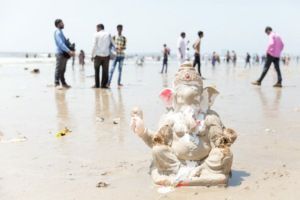What happens when a curious Indian meets a sceptical Dane? It could create a conundrum situation. While there are Indians who are really curious and Danes who are really sceptical, it is not a good idea to generalise – not every Indian is curious and not every Dane is sceptical, of course. However, it is worth keeping these observations with regard to cultural tendencies in mind the next time you encounter a similar situation.
READ MORE: Opinion: “Could you say ‘rødgrød med fløde’?” – “Yes, but why?”
Interesting Indian inter-state travels
Let’s take a closer look at this matter. It appears to be true that the Indians are really curious to know things and find information about almost everyone and everything. They do this believing that establishing trust is important when beginning a relationship with someone.
Furthermore, it is quite common in India to talk to each other and share personal stories: sometimes in extensive detail, whilst travelling on trains, buses or planes. Interstate travel in India can hence be interesting as some people speak a completely different language and have different cultural insights, food, customs and traditions.
They talk to each other, exchange ideas and quickly become friends. Such quick friendships formed during the journeys may even become lifelong ones. This would neither be possible nor practical for other cultures like the Danish, the Germans or the Swiss. To them, friendships should be attained through years of building trust and attachment.
Relationship-oriented cultures
In cross-cultural text books, you can read about relationship-orientated as well as individualistic cultures. Relationship-orientated cultures found in Asia and Central Europe as well as Latin countries strive to build a relationship to gain trust first. Only then will they start doing business with the other one.
Alternatively, individualistic countries like America, Germany, and Denmark are mostly focused on ‘making deals’ – and they won’t show much interest in building a relationship in order to do business with someone.
The curious Indian
One of the most important pieces of advice I give during the intercultural training programs that I deliver for Indians going abroad is to withhold their curiosity – and their natural curiosity about the personal details of others in particular. There are many instances where the Indian curiosity has created some embarrassing moments.
Care for some examples?
– A newly recruited Indian junior manager in Munich was taken on an introductory tour by the office. While he was being introduced to a female member of the senior management team, the first question he asked was: “Are you married?” to which she replied “No”. The junior manager continued to ask even more questions, for example, about her age or where she lived. Eventually, he was wisely interrupted by the human resources executive, who apologised to the lady and took over from there.
– Another example was when a Danish couple on a train were talking to an Indian software engineer employed by Danske Bank in Copenhagen. The Danes introduced themselves and asked about the Indian’s experience in Denmark. After exchanging a few comments, the Indian man asked: “Are you married?” “Yes” was the reply. “Do you have children?” The Danes replied “No”. “Why not?” the Indian asked. At this point, the Danish couple didn’t know what to say.
– Even for me, it’s sometimes a bit challenging to handle the curiosity of fellow countrymen while travelling in India. Once, while I was on a train, an old man sitting next to me wanted to know what kind of document I was holding in my hand. He then reached out as if he wanted to have a look.
The Trinidadian writer V S Naipaul, who has Indian roots, wrote about his experiences whilst travelling in India in his article ‘The Writer and the World’. The following extracts from a conversation he had with a fellow bus traveller in India is quite interesting:
“Where do you come from?” It is the Indian question, and to people who think in terms of the village, the district, the province, the community, the caste, my answer that I am a Trinidadian is only puzzling. “But you look Indian.” – “Well, I am Indian. But we have been living for several generations in Trinidad.” – “But you look Indian.”
Three or four times a day the dialogue occurs, and now I often abandon the explanation. “I am a Mexican, really.” “Ah.” Great satisfaction. Pause. “What do you do?” – “I write.” – “Journalism or books?” – “Books.” – “Westerns, crime, romance? How many books do you write a year? How much do you make?” So now I invent: “I am a teacher.” – “What are your qualifications?” – “I am a BA” – “Only a BA.? What do you teach?” – “Chemistry. And a little history.” – “How interesting!” said the man on the Pathankot-Srinagar bus. “I am a teacher of chemistry too.”
He was sitting across the aisle from me, and several hours remained of our journey. In this vast land of India it is necessary to explain yourself, to define your function and status in the universe. It is very difficult.
‘Dreaming in Hindi’
In her autobiography ‘Dreaming in Hindi’, Katherine Russell Rich shares her experiences on the curiosity of people living around her in Udaipur. She mentioned that she began to suspect that the whole town belonged to the central intelligence agency.
“Madam, are you living in Sector Eleven?” a rickshaw driver asked. “My friend said he took you there from the bank two weeks ago.” – “Madam, who was that man who walked you home last night?” the candy shop owner inquired. She had to think, then remembered: “He is my teacher.” Also, she was asked many other similar questions by complete strangers. Where are you going in this heat? How much did you pay for that lamp? Why were you wearing a fancy sari two nights ago? Have you put on weight? And so on.
Another extract from Rich’s autobiography describing her experience while travelling in a rickshaw to see a doctor is also interesting:
“Once, on contracting a bug, I hailed a rickshaw to take me to the doctor’s. The driver was uncertain of the address, so he waved over a pedestrian, who looked at the slip of paper, looked at me, leaned into the back. Was it my head? The man wanted to know. Just a slight fever, I answered. What about my throat. Did that hurt? No, that was fine, I replied. Had I taken anything for it? He inquired. I gave a quick nod, yes. Allopathic or naturopathic? He asked. “Mujhe jaana hai,” I said, which loosely translates: “I know this is a silly idea, but I was thinking we could leave some questions to the doctor.”
From ancient Greece to India
Another interesting element is that the Indians are very interested in knowing second names. I have been asked many times about my second name and, it bothers me a bit.
Nevertheless, you can get some key information from a person’s second name in India and you are able to figure out what state a person comes from as well as his/her religion and sometimes even their social status.
This curiosity is also seen as a way to connect with a stranger, get to know each other and become friends. This type of behaviour is not restricted to those from India; other nationalities such as the Greeks, Italians and Spanish are also known for it.
Philoxenia, the love of strangers, or hospitality, was central to the ethos of the ancient Greeks. During this time, the stranger would be welcomed by the leader and offered shelter, food and a bath before being asked many questions by the host about his business. This was reinforced by the belief that the stranger might be one of the gods travelling in disguise as a test.
Homer’s ‘Odyssey’ uses hospitality as a powerful theme reinforcing the notion that the more civilized a society, the greater the level of hospitality.
India shares the same concept. The Sanskrit words ‘Atithi devo bhava’ means the guest is equivalent to a god. It comes from the ancient Hindu scriptures ‘The Upanishads’ and became part of the code of conduct for the society at large.
The sceptical Dane
Karen Blixen, who was born in 1885 in Denmark, once wrote to a friend that the Danish character was like ‘dough without leavening’. The reserved life in Denmark was suffocating for her. It was Africa that provided the freedom that she believed was essential to personal happiness. As a consequence, she moved away from Denmark to rather spent her life there.
The Danes always appear to be very reserved. In his book ‘The Almost Nearly Perfect People’, Michael Booth comments that the Danes are highly sociable when amongst friends. But to them, a friend is someone whom they have known for years – from their childhood, school days or university years etc. They have a close circle of friends and it is not very easy to get inside unless a high level of trust has been built over a long period of time.
According to Internations, 68 percent of expats in Denmark reported difficulties making local friends. The Danes do not see value in quick friendships, which is completely different from the Indian concept of making friends by asking strangers questions and relating each other to different aspects of life in India.
Foreigners from different countries living in Denmark make friends quickly among themselves and discuss the unfriendly nature of the Danes. I have interviewed many expats and made many interesting observations.
Speaking Danish is key
“In my experience, there is only one way you can integrate into Danish society,” a Croatian lady said. “It’s the Danish language.”
Danes are proud of their language. Even though they speak very good English, you can hear only Danish in the pubs, roads, clubs and meetings. But the challenge to non-natives is the fact that Danish is not an easy language to learn.
I thought my knowledge of German would help me a bit but the pronunciation of Danish words is very difficult to non-native speakers. A young Italian woman doing her Master’s in Copenhagen told me that “I have invited my Danish friend many times to Italy and she even stayed at my home twice. But she never invited me back to her home in Roskilde.”
Invasion of privacy is no-go in Denmark
In India, it is completely normal to say “See you again sometime” to someone, even to a stranger, at the end of a short conversation. But if you say “See you again” to a Danish lady in a similar situation, she’ll get puzzled in her mind and ask herself: “See me again? But why?”
For a Dane, asking too many personal questions is an act of intrusion. The Danes clearly have defined circles of privacy. There is a high respect for privacy that separates the working and personal lives of the Danish people. If you are coming from a culture where these circles’ limits are not so well defined, or maybe, where no such limits exist, it will be really challenging.
It is important for foreigners living in Denmark to note that invading someone’s privacy is unacceptable to the Danes. Furthermore, a Dane’s family and private life are also separate. Therefore, a teenager or an adult has their own private circle of which their family may not be a part of.
Curious Indian meets sceptical Dane
From an Indian point of view, not giving information generates a feeling of someone being secretive – feeling that this person can’t be trusted or has some hidden agendas in mind. Such a situation will put a Dane in a difficult situation if he or she is planning to live in India.
Indians also use the common North American greeting “Hi, how are you?” The expected reply is a simple “I am doing fine”. But if you ask the same question to a Dane, it will lead him to think that you really want to know how he or she is doing. Hence, a preferable greeting would be “Hi, it’s a pleasure to meet you”.
Mutual adaptability
So, how can someone handle such situations better? The key is to understand who the foreigner is. The foreigner has to adapt to both the said and unsaid rules of the land.
Whether it be an Indian or an Italian in Denmark, he or she should lessen her natural curiosity and try to observe and learn the cultural traits essential for them to adapt and integrate.
If it’s a Dane trying to begin a new life in India, he or she should be prepared to be more open in order to accept new friends and ideas. It should also be an opportunity to practise some patience and understand other people’s perspectives. Such a mutual cultural ‘give and take’ will ensure that you will have a more positive experience during your stay in a foreign land.


















